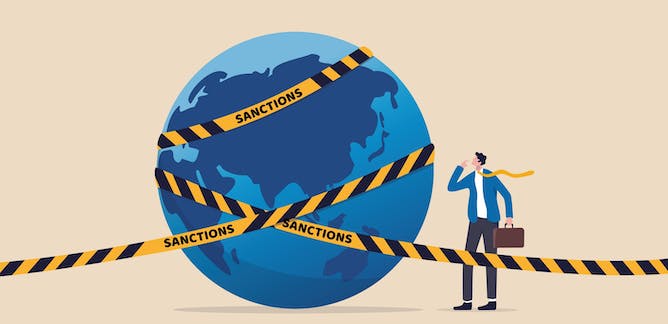
Table of Contents
Introduction
In the intricate web of international relations, economic sanctions emerge as a pivotal tool wielded by nations to achieve foreign policy objectives. These sanctions, varying from comprehensive economic and trade sanctions to more targeted measures such as arms embargoes, travel bans, and asset freezes, are used to coerce, deter, disrupt, or penalize entities or countries that pose threats to national security, violate international laws, or engage in objectionable behavior. While their efficacy and moral implications stir up rigorous debates, the undeniable truth is that sanctions reshape global dynamics. This treatise delves into the legal underpinnings of economic sanctions, examines their effectiveness, and scrutinizes their broader impact on international affairs.
The Genesis of Economic Sanctions: A Legal Outline
Economic sanctions find their roots in customary international law, where sovereign entities wield the power to engage and refrain from economic relations. Contemporary legal instruments that govern sanctions encompass a broad field, led primarily by the United Nations through Security Council Resolutions under Chapter VII of the UN Charter. These resolutions have the force of law, obliging UN member states to carry out sanctions against regimes or organizations that threaten peace and security.
On the other hand, bilateral sanctions are instated by individual countries, and their legality can be contentious if they contradict international commitments like World Trade Organization (WTO) agreements. For instance, the principle of non-discrimination under the General Agreement on Tariffs and Trade (GATT) often clashes with unilateral sanctions.
Apart from the UN and national legislation, regional bodies such as the European Union (EU) also contribute layers to the legal framework. The EU implements its sanctions policy under the Common Foreign and Security Policy (CFSP), binding all member states once adopted.
Measuring Effectiveness: What Do Sanctions Achieve?
The core of evaluating sanctions’ effectiveness lies in whether they change the target’s behaviour without inflicting undue hardship on the civilian population. The complexity distinguishes between apparent compliance by sanctioned entities and genuine effectiveness. Sanctions can apply pressure on regimes to alter their course, as can be gleaned from historical cases like apartheid South Africa or the nuclear program negotiations with Iran.
However, their impact varies widely, with some experts arguing that broad-based sanctions often fail to achieve their political objectives and instead result in humanitarian suffering. In contrast, smart or targeted sanctions that aim directly at decision-makers or sensitive economic sectors can circumvent broader social damage and increase the likelihood of achieving their objectives.
Critics also note the adaptability of rogue regimes to bypass sanctions through alternative financial systems or illicit trade networks. The longevity of sanctions against states like North Korea and Cuba raises questions about persistence versus adaptation. Furthermore, the extent to which sanctions impact domestic politics, spur civil unrest or consolidate autocratic rule remains a contested domain.
Global Ramifications: Sanctions Beyond Borders
Economic sanctions are far-reaching, affecting the target, third-party states, and the global economy. For instance, the extraterritorial application of U.S. sanctions has frequently led to disputes, given their impact on foreign businesses and nationals. These secondary sanctions, intended to tighten the noose around the primary target, may strain international relationships and provoke discussions on sovereignty and jurisdiction in international law.
Moreover, sanctions may catalyze shifts in global alliances and trade patterns as affected countries seek new markets and partners. They can cause unintended economic reverberations – distorting markets, causing price volatility, and impeding global economic recovery efforts, particularly in sensitive commodities like oil.
As an influence on global governance, sanctions reflect and shape the norms that underpin the international system. They signal norm enforcement, such as nonproliferation or human rights adherence, and carry a symbolic weight beyond their immediate practical effects.
The Future Trajectory: Sanctions in the Age of Global Interconnectivity
In the digital era, where financial systems and supply chains are interconnected, the concept of sanctions undergoes continual evolution. Cyber sanctions targeting individuals and entities linked to malicious cyber activities signify an adaptation to the digital battlefield. Concurrently, global challenges like climate change and pandemics open discussions on the need for cooperative international relations over confrontational tactics like sanctions.
Economic sanctions will undoubtedly persist as a staple in the diplomatic arsenal. However, their use raises fundamental questions about their alignment with broader peace, security, human rights, and global development goals. Sanctions must be deployed judiciously, backed by a clear legal framework, aimed at genuine effectiveness, and subject to rigorous periodic analysis to assess their impact on global affairs.
Closing Reflections
For international relations scholars, legal professionals, and global policy analysts, understanding the multifaceted implications of economic sanctions is more than an academic exercise; it’s a necessary engagement with one of the defining tools of contemporary geopolitics. Keeping a pulse on the evolution of economic sanctions, in practice and legality, offers critical insights into the complex dynamics governing international relations today and into the future.
As the world grapples with the intricate play of economic coercion and its consequences, it becomes increasingly vital to learn from past deployments, remain vigilant about the present implementations, and prospectively innovate more effective and humane methods of international dispute resolution. It is, after all, a dance where statutes, strategy, and the overarching aim of a harmonious international community dictate the steps.
